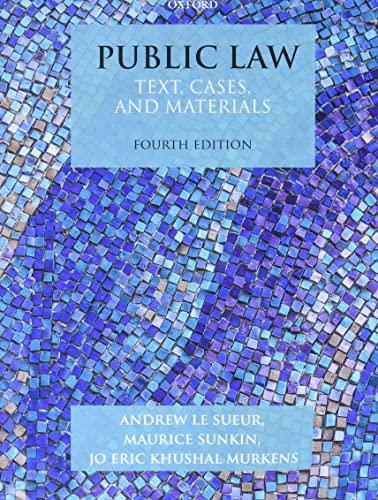Question
Time-in Team management Inc. (Time-in), incorporated under the Canada business Corporations Act, has been in operation for two years. Luke Bailey owns 55% of the
Time-in Team management Inc. (Time-in), incorporated under the Canada business Corporations Act, has been in operation for two years. Luke Bailey owns 55% of the common shares as he had the idea for the business, while Raina El Khoury owns the remaining 45%. Roger Wiley contributed $200 000 and was issued 100 preferred shares. An angel investor loaned the company $350 000. Luke and Raina are directors and officers of the corporation, and Roger is an officer although not a director. He is the president of the corporation.
Because Time-in hired a number of employees, Luke and Raina have been able to devote all their energy to sales and business development. Under their leadership, the company has done remarkably well, with $2 million in annual sales and excellent financial projections going forward. Not only do they have customers in all the major sports, but a broad range of organizations have also bought into their system. The company continues to field inquiries from abroad and is exploring an international launch. There is, however, a major problem confronting the company.
Several weeks ago, Raina approached Luke with the idea of Time-in purchasing a junior, semi-professional sport team. She told him that she had run the numbers and had concluded that such an investment was feasible, would be an excellent marketing ploy, and would be good for the the image of the company in the community. Luke responded by telling Raina that buying a sports team was easily one of the worst ideas he had in a very long time. "Eventually, I would agree that buying a team might well make some sense. But I'm not convinced that Time-in is currently big enough and profitable enough to own sports team. I suggest giving your head a really good shake because you are loosing your grip', he told her. Determined to have her way, Raina told Luke that if Time-in did not purchase the team, she would form her own company whose business purpose would be to buy a team and win a championship. "Then we'll see who is the smart one around here", she told him. Raina and Luke had been finding it increasingly difficult to get along given the pressures, tensions, and fatigue of running a rapidly expanding business. This particular disagreement had simply brought matters to a head.
In response, Luke decided to show Raina who was the boss. He called a share holders' meeting and, exercising his rights as a majority shareholder, voted Raina off the board of directors. For good measure, Luke also excluded her from participating in the management of Time-in. Raina is devastated because Time-in was her whole life.
Roger does not want to get involved in the dispute at all because he has much more immediate concerns. Roger believes that Time-in is plagued by lax standards in its day-to-day operations. From Roger's perspective, this is what Luke and Raina should focus their attention on. For example, Roger has discovered that Time-in has not been deducting and remitting income tax on salary paid to certain employees. Roger not only finds this unacceptable from an accounting perspective, but also worries about Time-in's liability and fears that he may have personal liability for this "oversight."
a) Applying the relevant legal principles, identify and explain in details whether Raina can anything or take any action about Luke voting her off the board and ousting her from management (5 marks)
b) Applying the relevant legal principles, identify and explain in details whether Time-in liable for the failure to deduct and remit income tax? Also, discuss Roger's liability for the failure to deduct and remit taxes (5 marks)
Step by Step Solution
There are 3 Steps involved in it
Step: 1

Get Instant Access to Expert-Tailored Solutions
See step-by-step solutions with expert insights and AI powered tools for academic success
Step: 2

Step: 3

Ace Your Homework with AI
Get the answers you need in no time with our AI-driven, step-by-step assistance
Get Started


